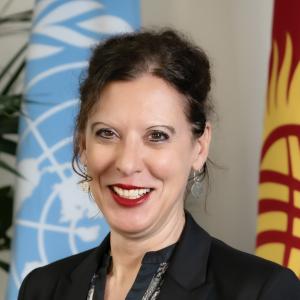Statement by UNRC Antje Grawe at the First CIS School meals forum in the Kyrgyz Republic.
Statement UN Resident Coordinator, Antje Grawe, at the First CIS School meals forum in the Kyrgyz Republic. Bishkek, State Residence #1 “Ala-Archa” November 23.
Excellency, Mr. Edil BAISALOV – Deputy Chairman of the Cabinet of Ministers of the Kyrgyz Republic,
Deputy Secretary-General of the Commonwealth of Independent States,
Ministers, Excellencies, Ladies and Gentlemen,
It is an honor to be here today and speak on behalf og the UN Country Team in Kyrgyzstan on the occasion of the first International Forum on School Feeding of the Commonwealth of Independent States. I would like to commend the Kyrgyz Cabinet of Ministers for organizing this event. This regional gathering provides an exceptional platform for us to exchange and disseminate best practices, fostering a collaborative approach to the effective implementation of school meals programmes.
Thanks to the proposal of the President of the Kyrgyz Republic, His Excellency Sadyr Japarov, school meals programmes are now identified as a subject of common interest among the CIS countries. This collective recognition serves as a solid starting point – not only for the systematic enhancement of nutrition and health in children, but also for the broader goal of improving education.
This Forum has also another significance.
Reflecting on the recent Sustainable Development Goals Summit convened by the UN Secretary-General in the margins of the UN General Assembly and the national commitments made by the Government of the Kyrgyz Republic regarding poverty alleviation, the reduction of inequalities as well as inclusive and quality education, the Forum demonstrates practical steps towards those commitments.
Excellencies, Ladies and Gentlemen
Unfortunately, today, millions of children around the world go to school on an empty stomach every day. The situation is exacerbated by multiple global crises, including the COVID-19 Pandemic, climate shocks, conflicts, and rising food prices.
Regrettably, Kyrgyzstan is not exempt from these challenges, as more than half of children in the country are deprived of adequate health and nutrition, decent living standards, early development, social inclusion, and protection. The Kyrgyz Republic is also facing a triple burden of malnutrition, with the levels of both stunting and anaemia among children and women of reproductive age remaining high.
Poor nutrition, combined with a lack of quality education and vocational training deprives many children of opportunities to attain sustainable livelihoods, contributing to inequalities.
Against this background, and given the intrinsic link between health and education, the school meals programme is goes far beyond filling stomachs. As a bedrock of educational opportunity, it lays foundations for developing the human capital for current and future generations. Therefore, the social impact of school feeding, as an integral part of the educational process, cannot be overestimated.
I wish to avail this opportunity to commend various efforts of the Government of the Kyrgyz Republic, such as:
- The approval of a school meals law in 2019 which was updated in 2023 to ensure the right of every primary schoolchild to receive safe, diverse, and nutritious school meals.
- Participation in the Scaling Up Nutrition (SUN) movement to accelerate national efforts in achieving nutrition targets.
- Development of the National Food Security and Nutrition Programme 2023- 2027 which aims to establish a basis for further promotion of local production and expansion of food variety, benefiting the Kyrgyz people including children.
Excellencies,
As the UN Country Team in Kyrgyzstan with its 25 UN entities including WFP, we collaborate with the Government in a collective and coherent manner to advance national education and health goals whilst reducing inequalities so that no one is left behind. Our joint efforts include – but are certainly not limited to:
- The National Integrated Micronutrient and Anthropometric Survey (NIMAS) that assessed the prevalence of micronutrient deficiencies, undernutrition, and obesity, providing an overall picture of the nutritional status of children and women.
- Similarly, the Rapid Landscape Analysis on Flour Fortification was conducted to reveal gaps and barriers in the legislation and develop appropriate policies. The analysis identified a minimum cost of a nutrient-dense diet for different groups of people and assessed its affordability.
- Comprehensive support of the Government’s social protection schemes.
- And of course, the school meals programme that the WFP delivers jointly with the Ministry of Education and Science, and which is embedded in an integrated approach to improve quality education.
Having said that, more needs to be done to achieve the Agenda 2030.
Kyrgyz Republic’s progress on SDG 2 [Zero Hunger] has been stagnant. In order to accelerate the progress, we need to focus on food security. The UN has recently identified six transitions, i.e., investment pathways to accelerate the delivery of the SDGs. Food systems is identified as one of the transformative entry points that has catalytic and multiplier effects on all SDGs.
The UN system in the Kyrgyz Republic is committed to continue supporting the Government’s efforts in improving health and education of children including for the school meals programme that indeed requires more national budgetary resources. [Currently it is KGS 7 per meal, recommendation is to increase it to KGS 20 per meal].
Beyond financial considerations, an integrated systemic approach to school health and nutrition is essential, requiring collaboration with stakeholders such as parents' associations and the private sector.
As we reach the midpoint of the 2030 Agenda for Sustainable Development, now is the opportune moment to take stock, engage in comprehensive conversations, and chart new horizons for our joint work, just like we are doing today.
I wish all of us a fruitful and enlightening discussion and thank you for your attention. Thank you!
Speech by



